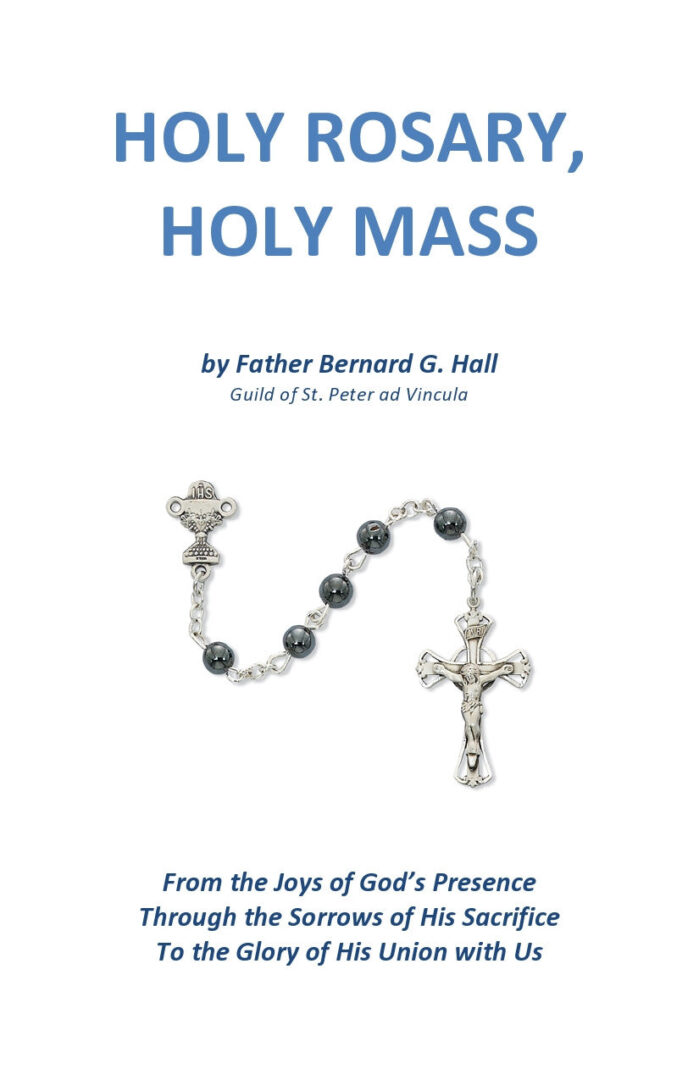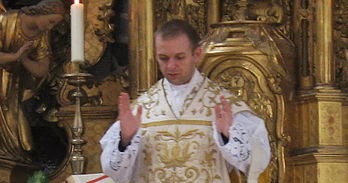Books for Eastertide


$11.95 – $25.95
Select options This product has multiple variants. The options may be chosen on the product page
Et Reliqua
Sermons and Reflections from the Deanery
Support our apostolate



Select options This product has multiple variants. The options may be chosen on the product page

Given in 1950 by His Eminence Francis Cardinal Spellman, Archbishop of New York
IT IS TRULY meet and just, indeed it seems providential, that the Holy Year of 1950 should be marked from its outset by the publication in English of the Roman Breviary. The appearance at any time of a new rendition of the Breviary may properly be regarded as an important event in the life of the Church. When this event is associated with the Year of Jubilee, and takes place in America, great significance rightly attaches to it. Perhaps one could say that this new translation, successfully undertaken in the United States, is America’s way of answering Our Holy Father’s call to penance and prayer in this Year of Reconciliation.

For the truth is, the Breviary is fast becoming the prayer-book of the nun in the convent, even as it has long been the daily book of prayer for the priest. It is more than likely to become the Vade Mecum of the man in the street. This hope is justified, for the world has urgent need of the spirit, both of penance and prayer, which the Breviary, when properly used, abundantly supplies. Any earnest soul who looks about for helps in his life of prayer and in his practice of penance, need look no further. The Breviary, which is the official prayer-book of the Church, brings great graces: such as the grace to know the mind of the Church, the grace to live the life of the Church, the grace to share in the mission of the Church. In a word, more than any other book, the Breviary reveals the inner spirit of the Church and, what is just as important, it attracts the soul to intimate union with Her. All is said when it is stated that the Breviary helps the soul through and beyond such union into unity with the Church, possessing with Her “cor unum et anima una.”
It is worth recalling in this regard that the closer the soul is to the Church, the closer it is to Christ. For, as Saint Paul teaches in so many places, the Church is “the body” of Christ (Eph. 5:30). Though this truth is shrouded in mystery, it emits bursts of light, as precious as they are dazzling. It helps the seeking soul to realize that the Son of God actually lives in His Church and works through Her, continuing in Her and through Her the mission He initiated in and through the Body Which His Virgin Mother gave to Him. It is an incentive to the soul to pray the prayer of the Church when the soul knows that Christ is now praying through the Church after the manner of His praying through His mortal Body. It gives courage to the soul to suffer with the Church when the soul is convinced that Christ is now suffering through His “body” which is the Church.
I point to this shining truth for the value it gives to the use of the Breviary. In this venerable book the Church has deposited the heritage of the ages, the inspirations which the Holy Spirit of God breathed into the minds and hearts of the faithful down the centuries. Actually, the thoughts dwelling therein are Christ’s own; He conceived them through the mind of the Church. The feelings to be found here, too, are His own; He experienced them through His life in the Church. The prayers, with which the Breviary is replete, reveal the way Christ prays in His Church. Any one essaying to pray with Christ can pray with Him, through the open mouth of His Church, by using this prayer-book of the Church. Such a soul can be sure that in praying thus he is echoing the prayer which the Holy Spirit played on the heart-strings of the saints, evoking purest melody before the Lord.
In fine, the Breviary can best be described as the daily prayer of the Church, beginning with morning prayers, called Matins, and ending with night prayers, Compline. From dawn till dusk, and into the black watches of the night, the Church prays by the Spirit of Christ; Christ, too, prays through “his body”, the Church. The Breviary is, thus, in very truth “the prayer of God” (Luke 6:12).
As a prayer-book, the Breviary is a library in itself, and a vast one, matchless for its variety, beauty and power. For instance, there are psalms of praise and petition, running the gamut of the emotions. These range from the woeful cry of misery in Psalm 29: “Out of the depths” to the hymn of exultation in Psalm 88: “The graces of the Lord I will sing forever”-the psalm, which Saint Teresa of Avila loved. There is history too. The Breviary contains selected readings from the lives of the patriarchs and prophets, as well as the history of Christ on earth and during the first years of His life in the Church. There is even prophetic history, wherein, as in the Apocalypse, the plan of God may be traced until its progress ends in triumph and glory for the striving God and regenerated humanity. All these are, of course, drawn from the Bible; in the Breviary, however, there is this advantage: they are read against a special background, proper to the various seasons and feasts of the calendar year.
A most appealing feature of the Breviary is this aspect of the spirit of the Church, expressing itself prayerfully through seasons and feasts. The praying soul who accompanies the Church through Advent is caught by Her radiant joy as She prepares, all expectant, for the journey to Bethlehem, with its Christ Child, the Angels’ Song and the nearing Star. The Office for this period is charged with a calm jubilation such as we cannot hope to enjoy in its fullness until we reach the Vision of Heaven. Then, there is the season of Lent. At its coming, the Church lays aside her festive robes and puts on sackcloth and ashes for the penances She needs must undergo if Christ is to have in Her, His Agony in the Garden and His Death on the Cross. All this is but a prelude to Her cry of triumph as She stands before the Empty Tomb, adoring Her Risen Lord, Who is within a few days to send down upon Her the Divine Spirit of Love.
To us who wander the way of life in cold and darkness, the use of the Breviary affords much comfort through the short lives of the Saints as recorded in their feasts. These show how the Holy Spirit of Love worked the wonders of His grace in willing souls, thus giving to us both hope and strength against temptation. To the seekers after truth, the Breviary unlocks immense stores of wisdom through the explanation of Biblical texts by the great Doctors of the Church, such as Saint Jerome, Saint Augustine and Saint John Chrysostom. The lovers of sublime songs will here find the noble hymns composed by saintly singers and sung by the faithful, from the remote past up to the present day. I refer to the “Pange Lingua” of Saint Thomas Aquinas and the “Te Deum” of Saint Ambrose.
For a long time the Breviary was a closed book to the layman, largely because it was written in Latin. Yet its charm cast a potent spell wherever the priest prayed or the monk chanted his Breviary. In consequence, the demand for wider use of it has been growing more insistent. Moreover, this demand has been calling for better renditions, such as embody the newest translations of the Psalter and of the New Testament. Now that this present edition includes these features, it is to be hoped that the greater use of it will stimulate ever greater love for the Breviary. Certainly, such use of it will help to satisfy the inner hunger of those souls who yearn to pray through Christ, with Christ and in Christ, unto the praise of the glory of his glory, in which he hath graced us in his Son (Eph. 1:6).
In these fearful days of crises and crosses, the pattern of life in the world is tangled and oddly out of focus. Minds are confused at it, and hearts restless. If the human mind is to have calmness in crises, if the human heart is to have courage amid crosses, recourse must be had to the power that prayer gives and to the patience that penance brings. Prayer and penance, and they alone, can compose the problems now trying the souls of men. For this reason The Sovereign Pontiff’s proclamation of the Holy Year is, to this generation, like to the voice of John the Baptist in the wilderness of Judea; it is a call to penance and prayer, a promise of progress towards peace and plenty where now there are war and want. It is my earnest hope and belief that this new edition of the Roman Breviary in English may be fruitful in many souls, fruitful of prayer, fruitful of penance and fruitful of unity with Christ through His Church.
The Versicle Dominus vobiscum (The Lord be with you) may be said only by Bishops, Priests and Deacons.
Subscribers who have not been ordained at least to the diaconate must instead say Domine, exaudi orationem meam, with the Response Et clamor meus ad te veniat (O Lord, hear my prayer. And let my cry come unto thee).
If this latter Versicle and Response has already been said immediately prior to the Dominus vobiscum (eg. during the Preces), it is not said a second time.
